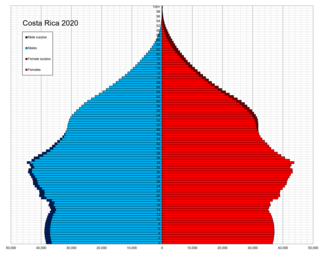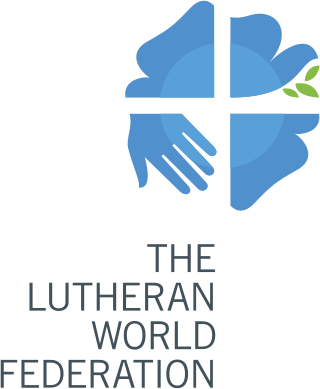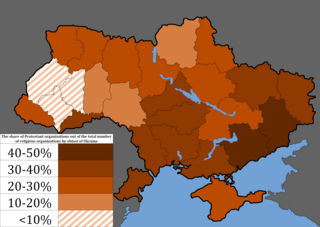Related Research Articles

This is a demographic article about Costa Rica's population, including population density, ethnicity, education level, health of the populace, economic status, religious affiliations, and other aspects of the population.

The Seventh-day Adventist Church (SDA) is an Adventist Protestant Christian denomination which is distinguished by its observance of Saturday, the seventh day of the week in the Christian (Gregorian) and the Hebrew calendar, as the Sabbath, its emphasis on the imminent Second Coming (advent) of Jesus Christ, and its annihilationist soteriology. The denomination grew out of the Millerite movement in the United States during the mid-19th century and it was formally established in 1863. Among its co-founders was Ellen G. White, whose extensive writings are still held in high regard by the church.

The Lutheran World Federation is a global communion of national and regional Lutheran denominations headquartered in the Ecumenical Centre in Geneva, Switzerland. The federation was founded in the Swedish city of Lund in the aftermath of the Second World War in 1947 to coordinate the activities of the many differing Lutheran churches. Since 1984, the member churches are in pulpit and altar fellowship, with common doctrine as the basis of membership and mission activity.

Protestantism is the third largest religious grouping in Bulgaria after Eastern Orthodoxy and Islam. In the census of 2011, a total of 64,476 people declared themselves to be Protestants of different denominations, up from 42,308 in the previous census in 2001 and from 21,878 in 1992. The marked rise in the number of Protestants in the last two decades is partly due to a boom in conversions among the Bulgarian Roma. In 2001, the two largest ethnic group among the Bulgarian Protestants were the Bulgarians and the Romani with some 25,000 members each.

There are 0.8 — 1.05 billion Protestants worldwide, among approximately 2.5 billion Christians. In 2010, a total of more than 800 million included 300 million in Sub-Saharan Africa, 260 million in the Americas, 140 million in Asia-Pacific region, 100 million in Europe and 2 million in Middle East-North Africa. Protestants account for nearly forty percent of Christians worldwide and more than one tenth of the total human population. Various estimates put the percentage of Protestants in relation to the total number of the world's Christians at 33%, 36%, 36.7%, and 40%, while in relation to the world's population at 11.6% and 13%.
Religion in Trinidad and Tobago, which is a multi-religious country, is classifiable as follows:
Protestants in Vietnam are a religious minority, constituting 1% of the population in 2022. Though its numbers are small, Protestantism is the country's fastest-growing religion, growing at a rate of 600% in the early 2000s.

Protestantism in Brazil began in the 19th century and grew in the 20th century. The 2010 Census reported that 22.2% of the Brazilian population was Protestant, while in 2020 the percentage was estimated to have risen to 31% of the population, over 65 million individuals, making it the second largest Protestant population in the Western world.

Christianity is a minority religion in Laos.

There are around 500,000 to 1,000,000 Protestants in Egypt, with 300,000 to 600,000 being members of the Evangelical Church of Egypt, Pentecostals number 300,000 to 350,000, and various other Protestants scattered in smaller denominations.

Protestants in Thailand constitute about 0.77% of the population of Thailand. Protestant work among the Thai people was begun by Ann Judson in Burma, who evangelized Thai war captives who were relocated to Burma. Protestantism was introduced to the country of Thailand in 1828 through the work of Karl Gutzlaff and Jacob Tomlin, the first two resident Protestant missionaries in Thailand.

Protestants in Ukraine number about 600,000 to 700,000 (2007), about 2% of the total population. Nearly all traditional Protestant denominations are represented in the country. According to Christianity Today magazine, Ukraine has become not just the "Bible Belt" of Eastern Europe, but a "hub of evangelical church life, education, and missions". At present, the country is a key supplier of missionaries and a center of evangelical training and press printing for all the countries of the former Soviet Union, where the legal environment is not so favourable.
The population of Angola is more than 92% Christian as of 2023.
Protestants in the Dominican Republic represent a sizeable minority of the population.
Protestant Christian churches in Mongolia are Lutheran, Presbyterians, Seventh-day Adventists and various evangelical Protestant groups.

Religion in Namibia is dominated by various branches of Christianity, with more than 90 percent of Namibian citizens identifying themselves as Christian. According to the government's survey, in 2013 up to two-thirds of the country was Protestant, including as much as 44% Lutheran.

Christianity is the predominant religion in Costa Rica, with Catholicism being its largest denomination. Catholicism is also the state religion, but the government generally upholds people's religious freedom in practice.

Protestantism is a branch of Christianity that emphasizes justification of sinners through faith alone, the teaching that salvation comes by unmerited divine grace, the priesthood of all believers, and the Bible as the sole infallible source of authority for Christian faith and practice. The five solae summarize the basic theological beliefs of mainstream Protestantism.
Protestants are the 4th largest religious group in Serbia, after Eastern Orthodox Christians, Roman Catholics and Muslims. In the 2011 census, there were 71,284 Protestants in Serbia and they comprised 1% of the population of the country. Ethnic Slovaks constitute majority of Serbia's Protestant community. Some members of other ethnic groups are also adherents of various forms of Protestant Christianity.
References
- ↑ Murillo, Alvaro (7 July 2021). "Encuesta CIEP-UCR evidencia a una Costa Rica estatista y menos religiosa". Semanario Universidad. Retrieved 8 July 2021.
- ↑ Adventist Atlas
- ↑ Article from Adventist News Network